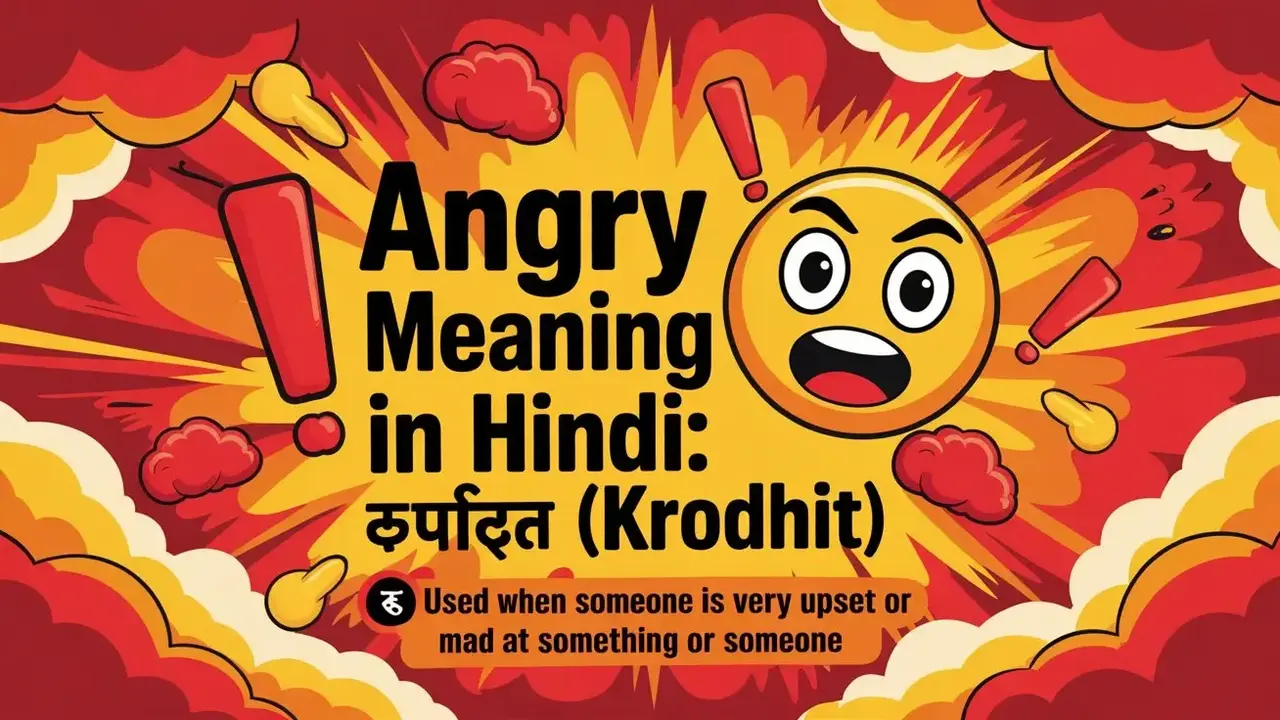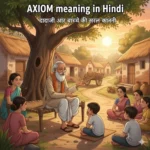The term “angry” in English translates primarily to “क्रोध” (krodh) in Hindi, representing a powerful emotional state characterized by irritation, annoyance, or rage.
This comprehensive exploration delves into the nuanced meanings, varied contexts, linguistic variations, and cultural expressions associated with anger in Hindi language. The emotion of anger manifests differently across cultures, with Hindi offering rich vocabulary to express its various intensities and manifestations—from mild irritation to intense fury.
Table of Contents
Introduction to Angry Meaning in Hindi
😡 What Does “Angry Meaning in Hindi? Let’s Break It Down!

Have you ever felt your face heat up, your fists clench, and your heart race — all because someone pushed your buttons?
Yep, that storm inside you is called anger, and it’s something we all experience.
In English, we say someone is “angry”, but how do you express that same fiery emotion in Hindi?
👉 The most direct translation of “angry” in Hindi is “क्रोधित” (Krodhit).
But that’s just the beginning — the Hindi language has an entire emotional palette to describe different shades of anger.
Loyal Meaning in Hindi and English
2025 Hyundai Palisade
Hindi Meaning of Curiosity
Credit Meaning in Hindi
🌩️ Anger in Indian Culture — More Than Just an Emotion
In Indian philosophy, anger isn’t just a mood swing — it’s seen as a powerful force that needs to be mastered.
📚 In sacred texts like the Bhagavad Gita, anger is considered one of the three gateways to ruin, alongside lust and greed.
It warns that unchecked anger can destroy relationships, peace of mind, and even your inner self.
That’s why in Indian literature, stories often teach us to control क्रोध (krodh) through calmness, meditation, and understanding.
🔥 Levels of Anger in Hindi: Angry → Angrier → Angriest

Just like English has “angry”, “angrier”, and “angriest”, Hindi offers nuanced phrases to show how deep the anger goes.
Let’s look at this emotion on a sliding scale:
Keyword and Translation in Indian Languages
| Language | Translation of “Angry” | Pronunciation |
| Hindi | क्रोध / गुस्सा | Krodh / Gussa |
| Telugu | కోపం | Kopam |
| Urdu | غصہ / ناراض | Gussa / Naraaz |
| Marathi | राग / क्रोध | Raag / Krodh |
| Kannada | ಕೋಪ | Kopa |
| Bengali | রাগ | Raag |
| Tamil | கோபம் | Kopam |
| Gujarati | ગુસ્સો | Gusso |
Angriness Meaning in Hindi and International Translations
Angriness, the noun form referring to the state of being angry, translates to “क्रोधितता” (krodhitta) or “गुस्सा” (gussa) in Hindi. This noun form is particularly useful in formal or literary contexts when discussing the concept of anger itself rather than describing an angry person.
| Language | Translation of “Angry” | Pronunciation |
| French | En colère / Fâché | On koh-lair |
| Arabic | غاضب | Ghadib |
| Spanish | Enfadado / Enojado | En-fah-dah-doh |
| Russian | Сердитый | Syer-dee-tiy |
| German | Wütend / Zornig | Voo-tend |
| Japanese | 怒っている | Okotte iru |
| Chinese | 生气 | Shēngqì |
| Italian | Arrabbiato | Ar-rab-biato |
Anger Meaning in Hindi and Its Different Contexts
The noun “anger” translates to “क्रोध” (krodh) or “गुस्सा” (gussa) in Hindi, representing the emotion itself rather than the state of being angry1. Understanding how these terms are used in different contexts is essential for proper communication in Hindi.
Anger Meaning in Hindi, in Different Contexts
| Context | English Term | Hindi Term | Usage Example in Hindi |
| General emotion | Anger | क्रोध (krodh) | उसका क्रोध देखकर सब डर गए। |
| Momentary reaction | Anger | गुस्सा (gussa) | अचानक उसे गुस्सा आ गया। |
| Controlled emotion | Annoyance | नाराज़गी (narazgi) | उसकी बातों से मुझे नाराज़गी हुई। |
| Intense anger | Fury | प्रकोप (prakop) | उसके प्रकोप से सभी भयभीत थे। |
| Righteous anger | Indignation | रोष (rosh) | उनके मन में अन्याय के प्रति रोष था। |
| Sustained anger | Resentment | आक्रोश (aakrosh) | लोगों में सरकार के प्रति आक्रोश बढ़ रहा है। |
| Irritation | Peeved | चिढ़ (chidh) | उसकी आदतों से मुझे चिढ़ होती है। |
| Rage | Wrath | कोप (kop) | देवी का कोप भयानक होता है। |
Each context reveals how Hindi offers specific vocabulary to express different shades and intensities of anger. For example, “नाराज़गी” (narazgi) implies a milder form of displeasure, while “प्रकोप” (prakop) suggests a more severe, potentially destructive anger.
Angered Meaning in Hindi and Synonyms
The past participle “angered” translates to “क्रोधित किया गया” (krodhit kiya gaya) or “गुस्सा दिलाया गया” (gussa dilaya gaya) in Hindi1. This form is used when discussing how someone was made angry by another person or situation.
Synonyms Table with Usage for the Angry Meaning in Hindi
| English Synonym | Hindi Synonym | Pronunciation | Meaning |
| Enraged | क्रुद्ध | Kruddh | Extremely angry |
| Furious | अत्यंत क्रोधित | Atyant krodhit | Very angry |
| Irritated | चिढ़ा हुआ | Chidha hua | Slightly annoyed |
| Indignant | रोषपूर्ण | Roshpurn | Anger due to unfairness |
| Irate | कुपित | Kupit | Very angry (formal) |
| Incensed | प्रकोपित | Prakopit | Extremely angry |
| Livid | आग-बबूला | Aag-babula | Furiously angry |
| Outraged | आक्रोशित | Aakroshit | Extremely angry due to offense |
| Fuming | तमतमाया हुआ | Tamtamaya hua | Visibly angry |
| Wrathful | कोपित | Kopit | Showing extreme anger |
| Annoyed | नाराज़ | Naraz | Slightly displeased |
| Vexed | क्षुब्ध | Kshubdh | Troubled and annoyed |
Example Sentences with Synonyms:Angry Meaning in Hindi
- क्रुद्ध (Kruddh): “अपमान के बाद वह क्रुद्ध हो गए।” (He became enraged after the insult.)
- चिढ़ा हुआ (Chidha hua): “लगातार शोर से वह चिढ़ा हुआ था।” (He was irritated by the constant noise.)
- कुपित (Kupit): “न्यायाधीश आरोपी के व्यवहार से कुपित हो गए।” (The judge became irate with the accused’s behavior.)
- आग-बबूला (Aag-babula): “अपनी कार के नुकसान को देखकर वह आग-बबूला हो गया।” (He became livid upon seeing the damage to his car.)
- नाराज़ (Naraz): “मां अपने बेटे की पढ़ाई के प्रति लापरवाही से नाराज़ थीं।” (The mother was annoyed with her son’s carelessness towards studies.)
Angry Meaning in Hindi and Antonyms
The direct translation of “angry” as an adjective is “क्रोधित” (krodhit), “गुस्से में” (gusse mein), or “नाराज़” (naraaz) in Hindi14. Understanding antonyms helps in grasping the full spectrum of emotional expression in Hindi.
Antonyms Table with Usage of Angry Meaning in Hindi
| English Antonym | Hindi Antonym | Pronunciation | Meaning |
| Calm | शांत | Shant | Peaceful state of mind |
| Happy | प्रसन्न | Prasann | Feeling or showing pleasure |
| Pleased | संतुष्ट | Santusht | Content with something |
| Joyful | आनंदित | Anandit | Full of joy |
| Content | संतुष्ट | Santusht | In a state of satisfaction |
| Peaceful | शांतिपूर्ण | Shantipurn | Free from disturbance |
| Serene | सौम्य | Saumya | Calm and tranquil |
| Composed | संयत | Sanyat | Calm and collected |
| Cheerful | प्रफुल्लित | Praphullit | Full of good spirits |
| Delighted | प्रसन्नचित्त | Prasannachitt | Very pleased |
Example Sentences with Antonyms:Angry Meaning in Hindi
- शांत (Shant): “गहरी सांस लेने के बाद वह क्रोधित से शांत हो गया।” (After taking a deep breath, he went from angry to calm.)
- प्रसन्न (Prasann): “अच्छी खबर सुनकर वह नाराज़ से प्रसन्न हो गया।” (Upon hearing the good news, he went from angry to happy.)
- संतुष्ट (Santusht): “माफी मांगने के बाद वह गुस्से से संतुष्ट हुआ।” (After the apology, he went from angry to pleased.)
- संयत (Sanyat): “मेडिटेशन की मदद से वह क्रोधित से संयत बन गई।” (With the help of meditation, she became composed instead of angry.)
- प्रफुल्लित (Praphullit): “बच्चों के साथ खेलने से वह गुस्से से प्रफुल्लित हो गया।” (Playing with children changed him from angry to cheerful.)
Related Idioms and Phrases for Angry Meaning in Hindi
Hindi language has numerous idioms and phrases that express anger in colorful and metaphorical ways. These expressions add richness to the language and often convey nuances that direct translations cannot capture.
Common Anger Idioms in Hindi &Angry Meaning in Hindi
- आग-बबूला होना (Aag-babula hona) – To become extremely angry (literally: to become fire-bubble)
Example: “जब उसने सच्चाई बताई, तो मालिक आग-बबूला हो गए।” (When he told the truth, the boss became extremely angry.) - खून खौलना (Khoon khaulna) – Blood boiling with anger
Example: “अन्याय देखकर उसका खून खौल उठा।” (His blood boiled seeing the injustice.) - आँखें लाल होना (Aankhein laal hona) – Eyes turning red with anger
Example: “बॉस की आँखें गुस्से से लाल हो गईं।” (The boss’s eyes turned red with anger.) - सातवें आसमान पर होना (Saatven aasman par hona) – To be extremely angry (literally: to be on the seventh sky)
Example: “वह गुस्से से सातवें आसमान पर था।” (He was extremely angry.) - तिलमिला जाना (Tilmila jana) – To become irritated/angry
Example: “उसकी बातें सुनकर वह तिलमिला गई।” (She became irritated after hearing his words.) - आपे से बाहर होना (Aape se bahar hona) – To lose self-control in anger
Example: “इस खबर को सुनकर वह आपे से बाहर हो गया।” (He lost control after hearing this news.)
Angriness Meaning in Hindi and Word Forms
Understanding the different grammatical forms related to anger helps in proper usage across contexts. The noun “angriness” translates to “क्रोधितता” (krodhitta) in Hindi, though in common usage, “गुस्सा” (gussa) is more frequently used3.
Different Word Forms Table
| Grammatical Form | English | Hindi | Example Sentence in Hindi |
| Noun | Anger | क्रोध (krodh) | उसका क्रोध देखकर सब डर गए। (Everyone got scared seeing his anger.) |
| Noun | Angriness | क्रोधितता (krodhitta) | उसकी क्रोधितता का कारण समझ में नहीं आया। (The reason for his angriness was not understood.) |
| Adjective | Angry | क्रोधित (krodhit) | वह बहुत क्रोधित दिख रहा था। (He was looking very angry.) |
| Comparative Adj | Angrier | अधिक क्रोधित (adhik krodhit) | आज वह कल से भी अधिक क्रोधित था। (Today he was angrier than yesterday.) |
| Superlative Adj | Angriest | सबसे अधिक क्रोधित (sabse adhik krodhit) | वह कक्षा में सबसे अधिक क्रोधित छात्र था। (He was the angriest student in the class.) |
| Verb | To anger | क्रोधित करना (krodhit karna) | उसकी बातें मुझे क्रोधित करती हैं। (His words anger me.) |
| Past participle | Angered | क्रोधित किया गया (krodhit kiya gaya) | वह अपमान से क्रोधित किया गया। (He was angered by the insult.) |
| Adverb | Angrily | क्रोधपूर्वक (krodhpurvak) | उसने क्रोधपूर्वक उत्तर दिया। (He replied angrily.) |
Frequently Asked Questions About Angry Meaning in Hindi






